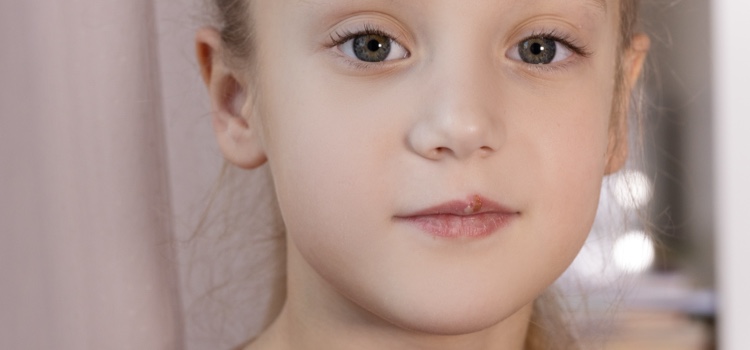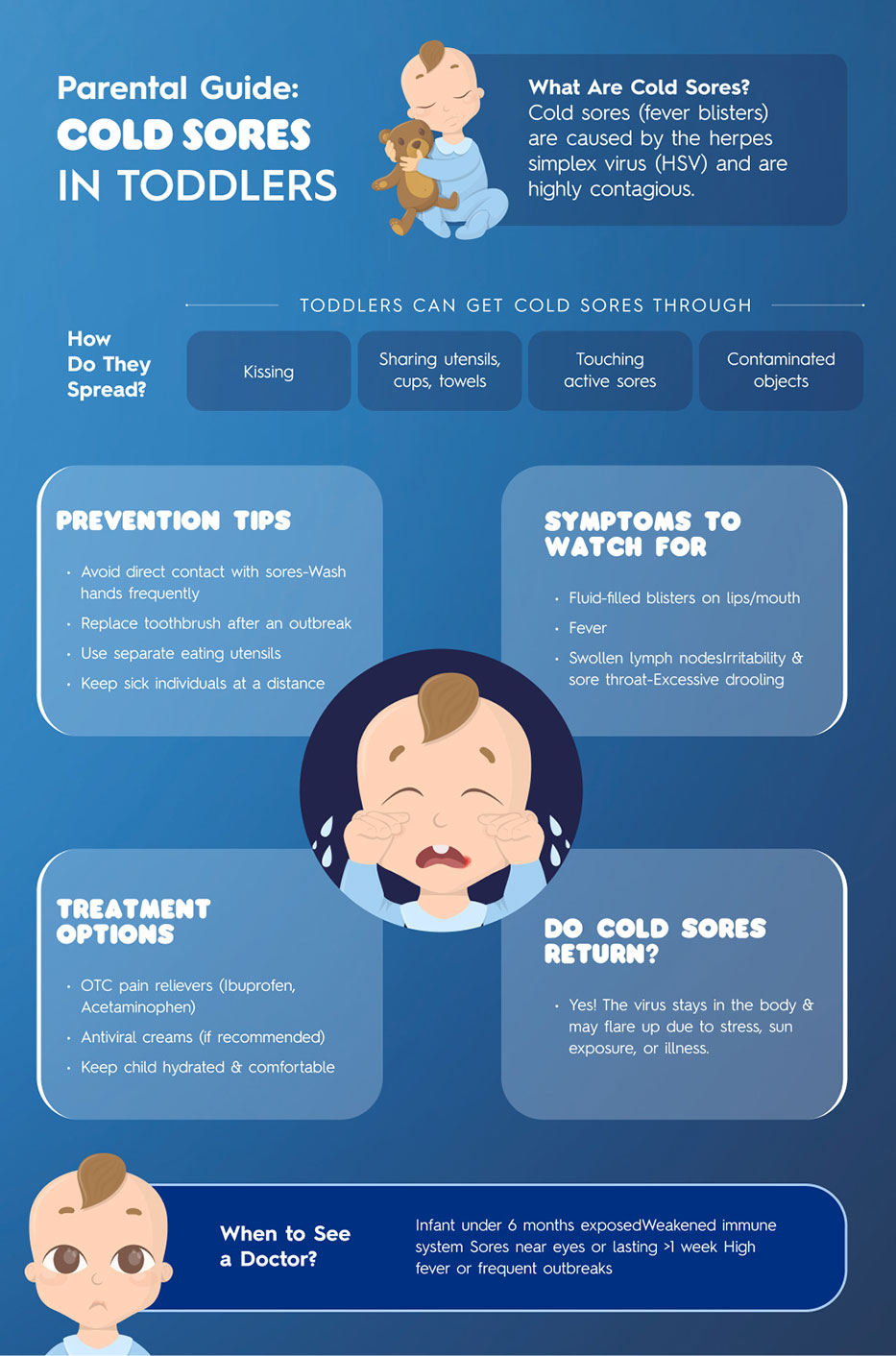Cold Sores in Toddler: Causes, Symptoms, and Prevention

Summary
Key Takeaways
- Cold sores in toddlers are caused by the herpes simplex virus (HSV).
- Cold sores, or fever blisters, are small, fluid-filled blisters that usually appear on the lips, mouth, and gums.
- Cold sores are highly contagious, and preventative measures should be taken to limit the spread.
Table of Contents

Approved and reviewed by Dr. Gans, a dental professional of over 10 years.
LEARN MORE >Key Takeaways
Healthcare concerns, such as cold sores, are just another bump in the parenthood journey. A highly contagious condition, cold sores are caused by the herpes simplex virus (HSV), and once contracted, they remain in the bloodstream for a lifetime. We understand that it can sound a bit scary, but we're here to help you navigate through it—find out what cold sores in your child might look like, how to deal with them, and how to prevent them from occurring in the first place.
What are Cold Sores in Toddlers?
Cold sores are always a bit of a worry, no matter what age. But when a toddler gets them, it can be especially concerning since they're more sensitive to the virus. These small, fluid-filled blisters can be painful and are highly contagious.

How Do Cold Sores Spread in Toddlers?
Direct contact with the saliva or skin of someone who has an active cold sore can cause the virus to spread to a child. According to HealhyChildren.org, when a child develops a cold sore for the first time, the blisters can spread across the lips, mouth, and gums.
Cold sores can be spread by:
- Kissing
- Sharing eating utensils
- Sharing washcloths
- Touching a cold sore that hasn't healed
- Inanimate objects that have come into contact with an active sore
Cold sores in infants under 6 months are especially worrisome since their immune systems are not yet well developed.
What Do Cold Sores in Toddlers Look Like?
Cold sores are small, fluid-filled, slightly raised blisters that can appear on a toddler's mouth, lips, and gums.
What are Cold Sore Symptoms in Toddlers?
Primary HSV refers to the first time a child or toddler develops a cold sore. These initial fever blisters can be accompanied by the following symptoms:
- Fever
- Swollen and tender lymph glands
- Irritability
- Drooling
- Sore throat
It's important to note that symptoms for a cold sore in a toddler can also be mild, and some caregivers may not notice them. Cold sores in children are primarily categorized by their blister-like appearance, if cold sores are a concern, be sure to monitor any blisters in your child's mouth and see your healthcare provider.
Do Cold Sores Come Back?
Once infected, the virus remains in the body for a lifetime. However, whether a cold sore flare-up occurs varies depending on the individual. Some children may experience cold sore flare-ups multiple times a year, whereas others may never get another cold sore on the skin again. Before a cold sore flare-up occurs, the first signs are usually tingling, burning, or itching.
How to Prevent Cold Sores in Toddlers – Tips for Parents
HSV is highly contagious, to help keep it from spreading, those with an active cold sore should:
- Avoid touching the cold sore
- Not kiss others
- Keep eating utensils, drinking glasses, and washcloths away from others and wash them after each use
- Swap out their toothbrush or toothbrush head for a new one
- Wash their hands often
The highly contagious nature of a cold sore is what makes these preventative measures so key. However, there are additional steps you can take to maintain the well-being of your little one in the event of a cold sore outbreak:
- Comforting your toddler or child: Reassure your little one that the cold sore will, in fact, go away and it's not something they need to worry about. Additionally, seek out advice from your pediatric health care professional on what you can do to help speed up recovery and lessen any discomfort your child may experience.
- Maintain positivity. Keep your child distracted to help take their mind off of the discomfort. Play their favorite games, read a book, and engage in fun activities to create a positive, happy environment for your toddler.
- Normalize it. Cold sores can make those of any age feel self-conscious. By talking about it and explaining to your child that many people experience cold sores, you can help them feel less reserved and more confident.
When to See a Healthcare Provider or Your Pediatrician?
KidsHealth.org recommends seeing your healthcare provider if your child:
- Is under 6 months old and is exposed to a cold sore
- Has a weakened immune system
- Has visible sores that do not begin to heal after a week
- Has sores near the eyes or experiences any discomfort or redness of the eye
- Gets frequent cold sore outbreaks
- Has additional symptoms such as fever or headache
If the sores appear to be alarmingly red, swollen, or filled with pus this can be a sign of a bacterial infection. See your pediatric health care professional right away if these symptoms occur.
How are Cold Sores Treated in Toddlers?
Cold sores in toddlers are often treated with over-the-counter medication, such as ibuprofen or acetaminophen for the pain. In some cases, a healthcare professional may prescribe an antiviral medication. But don't worry! Typically, cold sores in toddlers will go away on their own within a couple of weeks.
The physical symptoms of cold sores tend to go away on their own, however, there are measures you can take to help lessen or limit them if your little one gets them:
- Antiviral medications may be recommended by your medical provider, especially if cold sores are frequent and persistent. These are often topical and can help speed up recovery while also reducing cold symptoms.
- Seek out a pediatric medical professional for consultation, especially if it's your child's first cold sore outbreak. If the condition persists or worsens, consult your medical provider right away as there may be an underlying issue.
As a parent or caregiver, you always want to provide comfort for your little one. If they do experience a cold sore outbreak, here are a few home care tips to try that may help lessen the discomfort:
- Focus on Oral Hygiene: Avoid mouthwashes with alcohol or harsh toothpastes. Be sure to gently wipe your little one's gums and teeth with a damp washcloth or brush using a soft-bristled baby toothbrush.
- Keep Them Hydrated: Drinking plenty of fluids can help your child overcome an outbreak. Choose cool water or other hydrating beverages, while avoiding highly acidic and sugary drinks as those can further irritate the cold sore.
- Apply SPF: A lip balm with SPF helps protect your child from sun exposure and creates a barrier for the skin, especially if they're spending a lot of time outdoors.
- Use a Cold Compress: A great way to mitigate or relieve the pain or discomfort caused by a cold sore is by applying a cold compress to the affected area. This can also reduce the swelling associated with cold sores.
- Food Considerations: Opt for softer foods if your toddler has a cold sore outbreak. Chilled foods like yogurt can help as well as soft mashed potatoes. Avoid sugary or highly acidic foods to maintain the health of their smile.
Caring for Your Child's Oral Health
Although cold sores cannot be treated solely with a thorough oral hygiene routine, maintaining proper oral care practices can help lessen the symptoms and may aid in speeding up recovery time.
- Gently wipe your toddler's gums and teeth with a damp cloth after each feeding.
- Brush your child's teeth with an extra-soft bristled baby toothbrush.
- Floss their teeth at least once a day to remove trapped food debris and plaque from tight spaces and between teeth.
- Once your toddler turns 3, introduce an electric toothbrush to their daily oral care routine for more plaque removal and better cavity prevention. The Oral-B Kids Electric Toothbrush lineup features their favorite characters, a small round brush head that gets into all those nooks and crannies, and extra-soft bristles for a gentle clean you can rely on.
- Visit your pediatric dental provider twice a year for professional cleanings and checkups.
Kid's Oral Care Recommendations
Complete Your Child's Oral Care Routine
- Brush your baby's tender gums and teeth with a soft-bristled toothbrush for baby ages 0-2 twice a day for two minutes each session
- Switch to an electric toothbrush once your child is 3 to remove more plaque for healthy teeth and gums such as the Oral-B Kids Electric Toothbrush for kids ages 3+ featuring Disney and Marvel characters.
- Encourage healthy habits with the Disney Magic Timer App which helps kids brush up to 2X longer.
- Visit their dental professional twice a year for professional cleanings and checkups.
Equip your kids' oral care routine with the toothbrush, toothpaste, and mouthwash that's right for them.
FAQs
-
Can an infant get a cold sore?
-
Can babies get cold sores from teething?
-
Are cold sores dangerous for infants?
-
How do babies get cold sores?
Sources
- https://www.cedars-sinai.org/health-library/diseases-and-conditions---pediatrics/h/herpes-simplex-virus-cold-sores-in-children.html
- https://kidshealth.org/en/parents/cold-sores.html
- https://www.health.ny.gov/diseases/ communicable/herpes/newborns/ fact_sheet.htm#:~:text=Newborns 20can 20sometimes 20get 20HSV 1 20outbreak 20(cold 20sores)
- https://www.healthychildren.org/English/health-issues/conditions/skin/Pages/Herpes-Simplex-Virus-Cold-Sores.aspx
- https://www.nidcr.nih.gov/health-info/fever-blisters-canker-sores#:~:text=are 20not 20contagious.- Causes 1%2C 20or 20HSV%2D1
Table of Contents
- What are Cold Sores in Toddlers?
- How Do Cold Sores Spread in Toddlers?
- What Do Cold Sores in Toddlers Look Like?
- What are Cold Sore Symptoms in Toddlers?
- Do Cold Sores Come Back?
- How to Prevent Cold Sores in Toddlers – Tips for Parents
- When to See a Healthcare Provider or Your Pediatrician?
- How are Cold Sores Treated in Toddlers?
- Caring for Your Child's Oral Health
- Kid's Oral Care Recommendations
-
- FAQs
- Sources

Approved and reviewed by Dr. Gans, a dental professional of over 10 years.
LEARN MORE >
Sign Up
for expert advice and exclusive offers

Sign Up
for expert advice and exclusive offers

